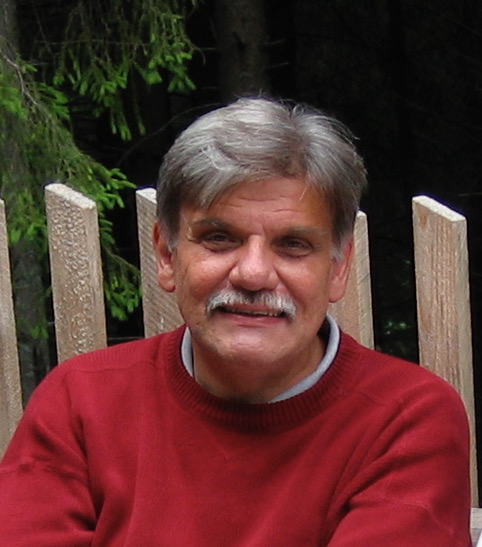February 4, 2020
Behind the Pen: Meet Chicago Historian Dominic Pacyga
Interview by Meryl D'Sa
 Dominic Pacyga, an urban and ethnic historian, discusses the importance of “place” and “space” in fiction and nonfiction, and how where we are and live can impact the way we behave and respond to what life offers us. Dominic will be giving a presentation on “The Importance of Place in Storytelling” during the 2020 Let's Just Write! An Uncommon Writers Conference.
Dominic Pacyga, an urban and ethnic historian, discusses the importance of “place” and “space” in fiction and nonfiction, and how where we are and live can impact the way we behave and respond to what life offers us. Dominic will be giving a presentation on “The Importance of Place in Storytelling” during the 2020 Let's Just Write! An Uncommon Writers Conference.
Q: Describe your writing space. Do you have any favorite writing spots?
A: Over the years I have written in many different places. Today, I have a home office, but I take my laptop to various spots in my home and write. In spring, summer, and early autumn, I like to sit on my enclosed front porch and work. It is a bright space and rather comfortable.
Q: What do you think are the most important elements that make good writing?
A: I think one must write simply and to the point. I avoid the use of jargon as much as possible. Writers must avoid the temptation to think that every sentence they write is excellently crafted. It is important to write, rewrite, and rewrite again and again. I read my manuscripts more than twenty times and make changes before sending them to my editor. I then receive comments and rewrite yet again.
Q: Every writer needs a few stars to align to help create good literary work. What resources do you work best with and why?
A: I write historical accounts so I reference primary sources in archives, newspapers, and many secondary sources. You cannot do too much research, but you also must know when to stop and put it to paper.
Q: What genre do you write in? What draws you towards this genre?
A: I am a historian. The past has always fascinated me because it tells us how we got to where we are now. As an urban and ethnic historian in particular, I am drawn to the stories that center on Chicago.
Q: What is the core message you wish to pass through your conference topic, “The Importance of Place in Storytelling”?
A: The core message is the important role that “place” plays in any work of non-fiction or fiction. I think it must be understood that “place” is an important character in any story, in any life. It determines one’s range of actions. Place provides both challenges and opportunities. While many writers rightfully emphasize the role of individuals in fiction, history, non-fiction, biography, memoir, and creative non-fiction, the importance of place plays a major role equal to that of character development. How does the physical space of the city, suburb, small town, or rural area impact on individuals and expand or restrict their responses to life’s trials? How does place form the story the writer is trying to tell? A sense of place should be treated as equal to character in any history, fiction, or other type of writing.
Bio: Dominic A. Pacyga received his Ph.D. in history from the University of Illinois at Chicago in 1981. He has authored, or co-authored, seven books concerning Chicago’s history including Slaughterhouse: Chicago’s Union Stock Yard and the World It Made (2015), Chicago: A Biography (2009) and Polish Immigrants and Industrial Chicago (1991, 2001), Chicago: City of Neighborhoods with Ellen Skerrett (1986), Chicago: A Historical Guide to the Neighborhoods (1979) with Glen Holt, Chicago’s Southeast Side (1998) with Rod Sellers. Pacyga’s newest book is, American Warsaw: The Rise, Fall, and Rebirth of Polish Chicago published by the University of Chicago Press in the fall of 2019. He has lectured widely on topics ranging from urban development, residential architecture, labor history, immigration, to racial and ethnic relations, and has appeared in both the local and national media. Pacyga was a member of the Humanities, History, and Social Sciences Department at Columbia College/Chicago from 1984 until his retirement in 2017. He has consulted with various museums on a variety of public history projects. Pacyga has also worked with numerous neighborhood organizations as well as ethnic, labor, and fraternal groups to preserve and exhibit their histories. He and Charles Shanabruch are co-editors of The Chicago Bungalow (2001). Pacyga has won both the Oscar Halecki Award from the Polish American Historical Association for his book, Polish Immigrants and Industrial Chicago and the Catholic Book Award for Chicago: City of Neighborhoods. In 2014 he was awarded the Miecislaus Haiman Award by the Polish American Historical Association for his contribution to Polonia Studies. In both 1999 and 2011 he received the Columbia College Award for Excellence in Teaching. In 2015 he won the Russell P. Strange Memorial Book of the Year Award from the Illinois State Historical Society for Slaughterhouse. Pacyga has been a Visiting Professor at both the University of Chicago and the University of Illinois at Chicago. In 2005 he was a Visiting Fellow at Campion Hall, Oxford University. He was awarded a Fulbright Grant and taught in the Institute for American Studies and the Polish Diaspora at the Jagiellonian University in Kraków, Poland during the 2013-2014 academic year.
Interested in attending the conference? Visit https://www.chicagowrites.org/conference for more!

Interview conducted by CWA intern, Meryl D'Sa
Meryl D'Sa, transplant from Mumbai, recently earned her MFA in Creative Writing from Florida Atlantic University, where she also worked as a graduate teaching assistant and as the visual art editor and social media handler for the program’s literary magazine Swamp Ape Review. In her writing, she often tries to go beyond what feels comfortable in order to better understand herself and the world. She writes, she breaks form, she reads, she pets dogs, she lovers ginger wine and all kinds of peppers.
Affiliates/Partners
Testimonials
Contact
Join CWA
Member Directory
My Account
Writers Conference
Presenters
Agents and Publishers
Pitch Sessions
Sponsors
Scholarships
Speaker Registration
Book of the Year
Spirit Award
First Chapter Contest
Resources
Home
Chicago Writers Association
info@chicagowrites.org
Make a Difference!

